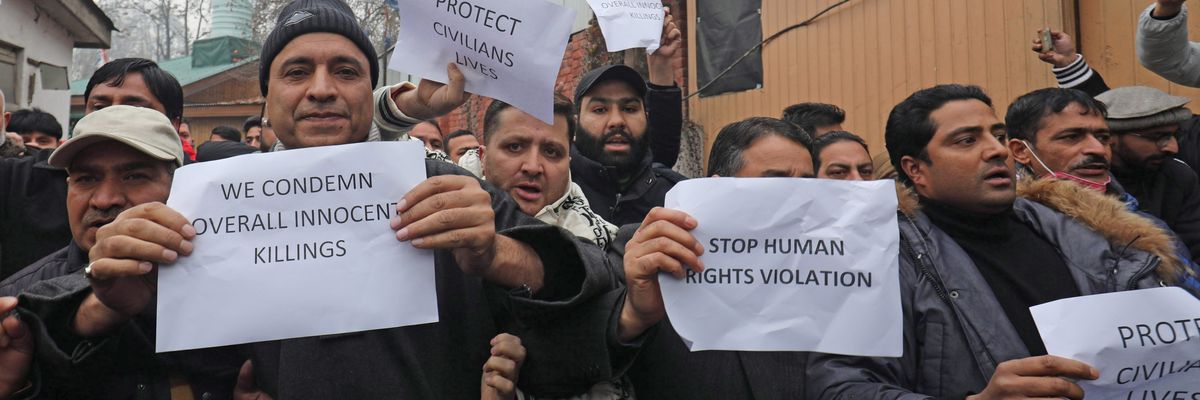Outraged protesters took to the streets of Srinagar, the capital of Indian-administered Jammu and Kashmir, on Saturday following the deaths—and alleged torture—of three Muslim men who were detained by authorities after a deadly ambush on government troops.
According to their relatives, the three men—Mohammad Showkat, age 22; Safeer Hussain, 45; and Shabir Ahmad, 32—were among eight people detained in Topa Pir in Poonch district early on Friday, a day after unknown assailants killed four Indian soldiers and wounded several others in an ambush near the village. The men were members of the Gujjar, traditionally a pastoral mountain people.
Police later called the victims' families and told them to claim the bodies, which relatives said showed signs of severe torture. Grieving loved ones said the men were "tortured to death."
"There were torture marks on his body. What kind of justice is this?"
Videos posted on social media purportedly showed the men being tortured.
"There were torture marks on his body. What kind of justice is this? He died of excessive torture," Husain's brother Noor Ahmad told Al Jazeera. "We want justice, those who killed these innocent people should be punished. My brother has four children."
Mohammad Iqbal, a local businessman and an uncle of one of the victims, toldThe New York Times that the men "were innocent civilians."
"This is a grave injustice," he added.
Local resident Mohammed Younis toldThe Associated Press that the detained villagers were beaten and electrocuted by Indian forces.
"My two brothers and a cousin are badly hurt due to torture," he said. "They are being treated in an army hospital."
The men's deaths sparked angry protests in Srinagar, the largest city and summer capital of Jammu and Kashmir.
Authorities cut off internet service in Poonch and nearby Rajouri, a common move during periods of unrest meant to thwart protests and the dissemination of images and information about government abuses.
The Indian Army—which said it is investigating the incident—claimed on social media that it "stands committed to extending full support and cooperation in the conduct of investigations."
However, critics of India's 75-year control of Jammu and Kashmir—which is claimed by both India and Pakistan, who've fought three wars and numerous smaller skirmishes over the divided region—say authorities cannot be trusted to ensure justice and accountability.
Poonch, in southern Kashmir, is located near the Line of Control, the de facto border of India and Pakistan. The village and surrounding areas have generally been spared from human rights abuses including extrajudicial killings and forced disappearances that Indian forces have perpetrated throughout the Kashmir Valley.
Last month, an Indian military court, disregarding a police investigation and army court martial, suspended a life sentence and granted bail to an army captain accused of killing three civilians in Rajouri in 2020. The victims refuted officials' claims that the men were militants, insisting they were laborers searching for work.
In 2019, India deployed hundreds of thousands of additional troops to Kashmir as the government of Prime Minister Narendra Modi fulfilled a campaign promise of his right-wing Hindu nationalist Bharatiya Janata Party (BJP) by revoking Article 370, which granted Kashmir the autonomy to make its own laws in all areas except communications, defense, finance, and foreign policy.
Modi's government also split Kashmir into two regions—Jammu and Kashmir and Ladakh—and placed them under New Delhi's direct rule. Kashmir's constituiton and flag were abolished.
Earlier this month, India's Supreme Court upheld the government's revocation of Kashmir's special status. The court also ordered the Election Commission of India to hold elections for the Jammu and Kashmir Legislative Assembly by next September, and recommended the establishment of a Truth and Reconciliation Commission to investigate human rights crimes committed by all parties.
According to Amnesty International, the Indian government has "drastically intensified" its repression in Jammu and Kashmir since the revocation of Article 370.
"Civil society at large—and journalists, lawyers, [and] human rights defenders in particular—have faced relentless interrogations, arbitrary travel bans, revolving door detentions, and repressive media policies while blocking access to appeals or justice in courts and human rights bodies," Amnesty said in a recent report.
"Additionally, the government recently revealed that Jammu and Kashmir accounted for the highest number of deaths involving the police... in India," Amnesty added. "There is a lack of accountability for use of force in the region by the police due to the continued enforcement of the Armed Forces Special Powers Act, which grants them additional powers and impunity and falls short of international human rights standards."
In an opinion piece published recently in Daily Sabah, Yousaf Junaid, Pakistan's ambassador to Turkey, wrote of Jammu and Kashmir:
It is the region where generations after generations of Kashmiris have only seen darkness of tyranny, oppression, and state terrorism. During this inhuman occupation, over 100,000 Kashmiris have been martyred, thousands of youth abducted and maimed, and women raped by Indian occupation forces. Demolishing properties of Kashmiris, arbitrary detentions, fake cordon and search operations, bans on congregations, social media restrictions, and brute physical torture including the indiscriminate use of pellet guns have become a norm there.
While the Indian government won't say exactly how many troops have been deployed to Jammu and Kashmir, experts believe the number is around 600,000. Critics have compared the situation with Israel's illegal occupation of Palestine. India and Israel—which is also ruled by a far-right ethnonationalist government—have forged close economic and security ties in recent years.
